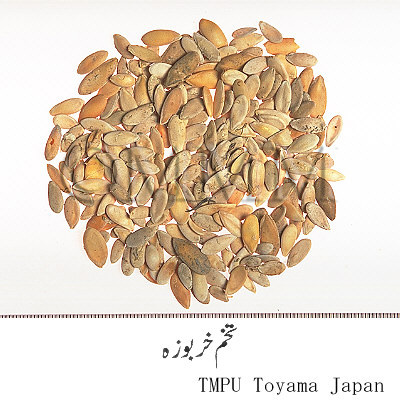Crude drug sample data base
※Click on the image to enlarge it.
The capital city, provincial capital city or the representative
location of its administrative area is indicated.
location of its administrative area is indicated.
Production area information
https://ethmed.toyama-wakan.net/img/pin_san.png
25.0700428
67.2847875
Collection information
Islamic Republic of Pakistan,Karachi [Karachi], Sind
https://ethmed.toyama-wakan.net/img/pin_nyu.png
Scientific information data base
| Crude drug name | Urudu name, English name | Tukhm e-kharpazah, Musk-melon, Sweet-melon | ||||
|---|---|---|---|---|---|---|
| Arabic name / Persian name | Bazr al-biteekh / Tukhme-khar-pazah | |||||
| crude drug image |
| |||||
| Original plant name | Cucumis melo Linn. | |||||
| Family name | Cucurbitaceae | |||||
| Used part | Seeds | |||||
| Distribution area | A creeping, hispid annual, native to Africa and is now commonly cultivated throughout India particularly in hot and dry north-western areas for its fruits which are eaten as dessert. | |||||
| Description | The kernel is whitish and oily and is used as drug and is called Maghz tukhm kharpazah. | |||||
| Function and properties | Fevers, Liver, Cosemtics, Excretion. Diuretic and emmenagogue, removes obstructions from gall bladder, kidneys and urinary bladder, detergent and deobstruent. | |||||
| Specific actions | Removes hepatic obstructions and acts as useful diuretic. | |||||
| Frequency in use | Very common. | |||||
| Common uses | Fevers: Due to its diuretic action it acts as febrifuge. Liver: Being deobstruent it removes hepatic obstructions and removes the swellings of liver and urinary bladder. Cosmetics: Being detergent it improves the complexion of the face. Externally the seeds are used as embrocation in some skin diseases. Seeds are also regarded as nutritive tonic. Excretion: Its seeds are useful in anuria, amenorrhoea/amenorrhea, gonorrhoea/gonorrhea and against the stones of urinary bladder, after removing its oily portion. | |||||
| Side effect | It is harmful in the disorders of spleen. | |||||
| Medical system | Unani | |||||
| Traditional concept | Temperament | It is hot and moist in the second degree. | ||||
| Drug effect | Very beneficial in hepatic and intestinal obstructive conditions. Not good during the disorders of spleen. | |||||
| Dosage | 5 to 7gm. | |||||
| Substitute | Tukhm Kakri (Cucumis melo Linn. var. utilissimus Duthie & Fuller) | |||||
| Corrigent (corrective) | Pure honey. | |||||
| Important compound preparations | Tiryaq-i-Masana, Jawarish Zar`uni Sada, Sherbat Bazuri Baarid and Ma`jun Zanjibil. | |||||
| References | Reference book Tips! | Indian Materia Medica, Vols. 1-2, 1976 (Repr. 1989). Nadkarni, A.K., Popular Prakashan Pvt. Ltd., Bombay Vol. 1, p 402. Makhzanul-Mufradat (Khawasul Adviyah), Hakeem Kabiruddin, Daftar Al-Masih, Qarol Bagh, Delhi. p 189-190. A Survey of Drugs, 1961 (2nd edi.). Wahid, A. K. and Siddiqui, H. H. Institute of History of Medicine and Medical Research, Delhi. p 19-30. Dictionary of Economic Plants in India, 1996 (2nd Rep.). Singh, U; Wadhwani, A. M. and Johri B.M. Indian council of Agricultural Research, New Delhi. p 61. Hamdard Pharmcopoeia of Eastern medicine, 1969. Said, H. M. (editor), The Times Press, Sadar Karachi. p 77, 82, 174, 272. Indusyunic Medicine, 1997. Usmanghani, K., Saeed, A. and Alam, M. T. Department of Pharmacognosy, Faculty of Pharmacy, University of Karachi, Karachi. p 189-190. | ||||
| Last renewal date | 2024/03/18 | |||||




